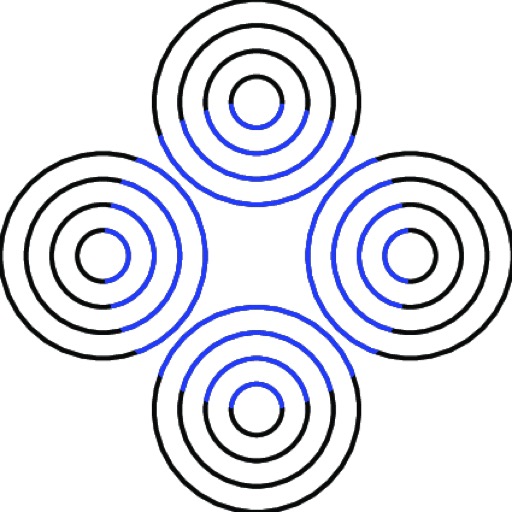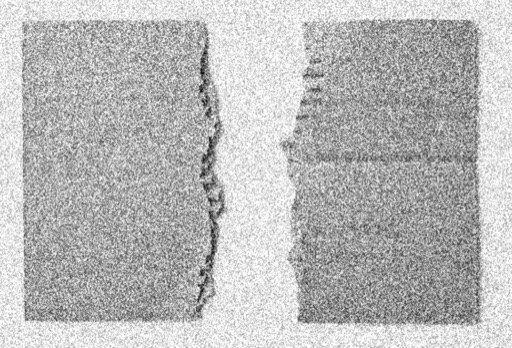Why I Do Not Believe In Intrinsic Subjectivity
views expressed dated: 2023-06
Of course, if water boils in a pot, steam comes out of the pot, and also a picture of steam comes out of a picture of the pot. But what if one insisted on saying that there must also be something boiling in the picture of the pot?
Imagine someone saying, "But I know how tall I am!" and laying his hand on top of his head to indicate it!
— Wittgenstein
Let's say that Mundanius buys some new coffee and takes a taste.

His friend Bloviatius, an avid coffee drinker himself, is curious and asks for some. To Bloviatius's great disappointment, Mundanius has purchased the cheap instant coffee, not the fancy gourmet coffee he was expecting.
Mundanius insists that the coffee is delicious while Bloviatius says that it --




Before Skepticus goes on about the Inverted Spectrum Hypothesis or something, I want to ask: How impossible is it really?
Many cognitive scientists and philosophers alike want to claim that there are intrinsically subjective properties that are in principle: ineffable, unsharable, and immediately apprehended by their "havers". So, they would say, 'tasting my taste' really is in principle impossible. I disagree.
I will argue that there simply are no intrinsically subjective experiences or properties as just described. I want to be clear that I am not arguing against the existence of subjective properties generally, just the so called in intrinsically subjective ones.
What is "Intrinsic Subjectivity"?
An intrinsically subjective property or experience is one which is in principle impossible for anyone but X to have. Mundanius could never, on this view, ever apprehend the subjective properties of experience that Skepticus has when he takes a sip of sub-par coffee. (For the sake of this argument I will treat intrinsically subjective properties, intrinsically subjective experiences and intrinsically subjective properties of experiences as all the same conceptually. I do not think this changes the nature or force of the argument at all.)
I think it can be agreed that intrinsically subjective properties are:
- Only in principle apprehendable by the subject
- Inherently ineffable
While subjective properties, generally, are:
- Only apprehended by the subject but may, in principle, be apprehended by others
- Difficult, perhaps practically impossible, to express or put into words (practically ineffable)
(by ineffable in this discussion, I will mean "not describable in any objective way") Note that defenders of the idea usually add that these properties are immediately apprehended by their "havers" without error. I will get to that later.
Clarifications
First, it will help to clear up a few confusions. When we wonder if we can have the "same experience" as others in everyday life we wonder things like "Will I get sunburned if you did?" or "Will I be as bored during this movie as my friend was?". That is not what we mean when we are discussing intrinsic subjectivity.
It would be silly to deny that "the taste" is not a sharable experience if "the taste" just meant that we were both tasting the same physical cup of coffee or the same brand. What is meant in reference to intrinsic subjectivity is some completely internal property of experience (not of coffee) that supposedly only the "haver of it" can have.
The Problem with "Only in principle apprehendable by the subject":
- Only in principle apprehendable by the subject
What's wrong with that? When Mundanius loves his instant coffee wouldn't Skepticus have to literally be (somehow) in Mundanius's consciousness in order to apprehend the experience that Mundanius has? This question is, I believe, misguided.
Let's examine further what can be meant by . There are two senses in which we could mean , logically and in the sense of metaphysical-possibility.
First, let's consider restated logically:
- M has an experience, X, which only counts as experience X by virtue of being M's experience
This sense is trivially true and uninteresting. Let's turn the to metaphysical-possibility sense:
- M has an experience, X. While X is an experience of some thing, Y, which is accessible to others, X itself cannot be had by other experiencers although other experiencers can have their own experiences of Y.
This we can sink our teeth into a bit.
What exactly is it that "cannot be had by other experiencers"? Surely it is "My experience of Y" but this cannot mean something intrinsically subjective. If I were able to pick out something intrinsically private by saying "My experience of Y", then how would I have been able to learn that it is an experience of Y at all? Knowing that I am having an experience of Y, as such, presupposes that I know what Y-experiences are. In order to possess the knowledge of Y-experiences, I must possess the requisite concepts. Of course, I can taste coffee before knowing that it is "coffee" or even "taste", but I cannot have knowledge of it as such. So how can what I call "My experience of Y" be intrinsically subjective, in principle inaccessible to any other experiencer? It could be, perhaps, if I could have knowledge of a concept that was in principle impossible for another to have.
What is it to have knowledge of a concept? Let's say for simplicity the concept of "red". I submit that the best account of what it is to have knowledge of the concept of red is to master the application of the term "red". Pragmatically speaking, how do we learn to use the concept "red"? Only by appeal to externally accessible criteria, that is how it is learned. So might we also appeal to some inherently internal criteria as well when we say "red"?
By this definition of concept acquisition, though, in order to have knowledge of a concept that was intrinsically subjective, I would have to be able to master a concept which only I could ever adjudicate the mastery of. However, this is extremely problematic because how could I ever know if I was correct or not? I could appeal to no externalizable conditions whatsoever because to do so would be to collapse the intrinsically subjective nature of the supposed knowledge. The inability to appeal to anything communicable, external, or effable strongly precludes the possibility of mastering a concept and, therefore, of having knowledge. Perhaps I could appeal to some other intrinsically subjective concepts to justify the other? Clearly this is an infinite regress. Perhaps I could appeal to something non-conceptual to justify my candidate intrinsically subjective knowledge? This seems like it will not work either as it is unclear how something non-propositional can serve the justificatory role for something that is. I cannot say "Umph and therefore I am".
Even if some such knowledge did exist it would be inherently inaccessible to communication with others in any way. However, it isn't the fact that it would not be communicable that would make it not knowledge, but rather the fact that justification is required for knowledge and it seems like there is no justification to be had here. Supposing somehow I could master concepts without any kind of externalizable rule, this notion of intrinsically private concept mastery is still problematic because it supposes that some concept could be mastered even though I had yet mastered no other. In that case it is far from clear what could stand in a justificatory relationship to any application of the concept that might serve to demonstrate mastery. It would need to be auto-justificatory. Even our most self-evident propositions are not auto-justificatory in this way (e.g. ) because they presuppose the mastery of the constituent parts.
Perhaps I cannot know something intrinsically subjective, but I can nevertheless have it? This would mean that I have some non-propositional intrinsically subjective content of some kind, perhaps the kind I have when I "have a toothache". When pressed for what we have that could be intrinsically subjective, we can only gesture inward and think "this". We'd like to think that is a contentful gesture, but it is not. It is not contenful because it is indexical through and through to the point of tautology. Such indexicals do not have any information in them. No matter what "this" is, the answer will be the same. No one would respond to the question "Where are you?" by merely saying "Here", with no additional locating information such as the origin of the sound of their voice. "I have this" says nothing about what I have just as saying "I am me" says nothing about who I am. Another strange thing about this claim that one has non-propositional intrinsically subjective content is that this "content" is definitely not the stuff of our everyday talk of things like "the taste of coffee".
"Taste this milk, does it seem fine to you?"
What role is this not-known-but-had intrinsically private content playing in that sentence? It seems none whatsoever. It is a theoretical departure from our common sense talk of thoughts and sensations that seems to serve no functional purpose. Additionally, it cannot be the "content" of any kind of empirical science of the mind either for again, if we give it any externally identifiable foothold its not intrinsically subjective anymore.
A thought experiment might help to show why the notion of intrinsically subjective content just drops out of the picture of human discursive behavior or any explanation of the mind.
Suppose that my identical twin and I are raised together in a research lab for "super-identical twins". We are the first of our kind. Suppose we are the two closest humans in history for genetic similarity. Within the confines of this fancy lab, the factors that could cause any epigenetic mutations are kept negligible and so on so that we are as close to each others genetic material as possible. Furthermore, our behavior is tightly controlled so as to be the exact same every waking second of the day. We walk the same visually identical path down monochrome hallways to eat our identical breakfast each morning with their molecularly identical coffees each morning. All of the taste-relevant and reaction-to-taste-relevant facts about our biology and our mental lives are the same. Suppose event hat we are frequently recalibrated to each other via FMRI-based brain restructuring every now and then as well.
When we take a sip each morning of our bland lab-coffee, is it not the same taste? By any means that my twin and I can have knowledge of the taste, it must be the same because we both learned from birth how to master concepts around reactive dispositions to "coffee taste". But perhaps we each have something different that is in principle unhaveable to the other? How could the scientist at the super-identical twin lab ever demonstrate that? They could not. It can play no role whatsoever in an explanation of our minds. What grounds (no pun intended) could my super-twin and I have for ever concluding that we don't have the same taste of the coffee? Should we really say "Perhaps we have radically different tastes but our reactions to those tastes are identical"? I believe at that point things get silly. It should be sufficient to say that a difference that makes no difference is not a difference worth caring about and this difference is worse than a difference that makes no difference. It is a difference that is defined as a difference which could never make any difference.
The problem with "Only in principle apprehendable by the subject" can be spelled out as follows.
The intrinsically subjective could be apprehended either as knowledge or mere acquaintance.
- It seems like we need to have the grasp of some concepts already in order to have some intrinsically subjective knowledge, those concepts could either be intrinsically subjective or not.
- If they are intrinsically subjective, it is unclear how their application could ever be justified.
- By raw feels doesn't work because they are not propositional and so cannot serve the justificatory role.
- Other intrinsically subjective concepts don't work because this leads to an infinite regress
- No definable rule works because as soon as it is defined it becomes externalizable.
- I could perhaps also assume some intrinsically subjective knowledge to be auto-justificatory, but this seems incoherent with any reasonable sense of justification.
- If they are not intrinsically subjective then my knowledge is not either because the concept I have learned to apply has an external (knowable by others) justification.
- If they are intrinsically subjective, it is unclear how their application could ever be justified.
- It seems like we need to have the grasp of some concepts already in order to have some intrinsically subjective knowledge, those concepts could either be intrinsically subjective or not.
Turning then to mere acquaintance (having something intrinsically subjective), we encounter a fresh set of difficulties:
- It is not clear what asserting that (absent any of the trappings of the justification game) can even be doing.
- Pure indexicals like "I have this" are tautological and cannot carry information about the variables they contain ("I", "This")
- Even if we grant that some non-knowledge acquaintance of this sort is possible, it seems to be empty of any pragmatic or theoretical value.
The defender of intrinsically subjective properties might still claim that the property was never physical and was instead epiphenomenal in the first place and so the thought experiment misses the point. They might say that perhaps we don't have knowledge of it and perhaps it plays no causal role, but it is nevertheless undeniably there. This claim requires a defense of its own. I believe the defenses of this claim fail. I will come to that in a moment.
The Problem with "Inherently ineffable":
- Inherently ineffable
It is worth noting that could be true while was false. We could have inherently ineffable experiences that someone else could in principle have, but there would then be no way of ever knowing what the same was.
It is also worth noting that because if some property X were effable, then I could somehow presumably find a way (however practically impossible) to have that experience (via the 'effability' of that information). If some property were only apprehendable by me, then it would not be effable because it if were another might apprehend it.
Nevertheless, I think is not a property experiences have. Consider:
If a property is fully expressible in information to a perceptual system it is, in principle, effable.
The brain creates our inner world solely by information-processing.
Unpacking a bit, it means that if something like the taste of coffee is fully expressible in information somehow, which gives us good reasons to believe is the case, then any experience we have is, in principle, effable.
is likely to be the most controversial among defenders of intrinsically subjective properties. Note that this is a different issue from the subject of Frank Jackson's Knowledge Argument because to undermine we only need . If there is some information, however complex, propositional, ability-based, etc. that could give us that experience, then is false of that experience.
might be rejected for two reasons. One, the defender of intrinsically subjective properties might object that is true, but that that information may not be computable by another information processing system by virtue of its nature. e.g. certain things are computable, but not by quantum computers. This is certainly not true of brain-to-brain interactions and is on shakey ground even in the quantum-computer-to-turing-machine case.
A second reason to reject might be believing that the brain creates our inner world by information-processing and some strongly-emergent property, that property being the intrinsically subjective one. There is, I think, little reason to believe in strong emergence.
Note that even outside a physicalist framework it is difficult to defend ineffability. need not involve physical information. If there is a ghostly realm of the mind, then it presumably must play by the rules of information as well. It is difficult to see how cognition would be possible with 0 possible information flow.
Non-Physical Properties?
As I mentioned in the issues with , the defender of intrinsically subjective properties might make the claim that the experiential property was never physical in the first and might, by that route, try to have an easier time defending intrinsic subjectivity. We might imagine a metaphysical picture where each subject has their own nook of reality, ontologically separate from every other's. This might allow the defender of intrinsic subjectivity to avoid some of the conundrums of .
How might the defender of intrinsically subjective properties have come to know that their experiences were rooted in some non-physical reality? It is typically claimed as obvious and the source is introspection or something like the aforementioned Knowledge Argument. Typically the primacy of the experience and the inability to be wrong about it is invoked in defense of this notion. I will argue here that the notion of immediate and error-proof apprehension of the "properties of ones experience" does not make sense and that the Knowledge Argument is misguided.
Let's look at introspection first:
From introspection, M knows that the property his experience has which is his "taste of coffee" is not a physical one. He can immediately apprehend it.
No one will argue that we do not have our sensations and that they are not experienced by us, but it does not follow we have privileged access to their metaphysical nature. Merely having these in fact tells us nothing about their metaphysical nature at all as it cannot give us knowledge. To illustrate the point, look at the following image:
What did you see?
How about this one:
Do you see one neon blue ring that overlaps the inner parts of the four outer rings?
You had a perception. Its full nature was not revealed to you. Additionally, your observation was theory-laden. Presumably, you saw one or the other first because of some predilection for one over the other. What reason do we have to suppose that when you introspect you are incorrigibly correct about the metaphysical nature of your experiences? I think none and so I reject .
The second way that the defender of intrinsically subjective properties might argue that experiential properties are non-physical is via the Knowledge Argument for epiphenomenal qualia. This argument is misleading, to say the least, and I believe it fails to secure the conclusion that there are any non-physical properties of experience.
The argument goes like this, straight from Frank Jackson's 1982 Paper "Epiphenomenal Qualia":
Mary is a brilliant scientist who is, for whatever reason, forced to investigate the world from a black and white room via a black and white television monitor. She specializes in the neurophysiology of vision and acquires, let us suppose, all the physical information there is to obtain about what goes on when we see ripe tomatoes, or the sky, and use terms like ‘red’, ‘blue’, and so on. She discovers, for example, just which wavelength combinations from the sky stimulate the retina, and exactly how this produces via the central nervous system the contraction of the vocal chords and expulsion of air from the lungs that results in the uttering of the sentence ‘The sky is blue’.… What will happen when Mary is released from her black and white room or is given a color television monitor? Will she learn anything or not? It seems just obvious that she will learn something about the world and our visual experience of it. But then is it inescapable that her previous knowledge was incomplete. But she had all the physical information. Ergo there is more to have than that, and Physicalism is false.
We can summarize fairly:
- Mary is a color scientist who is locked in a black and white room her whole life. Never seeing color.
- While in the room, Mary learns "all the physical information there is to obtain" about red.
- Mary is released from the room and sees red for the first time.
- Mary gains knowledge upon seeing red.
- Therefore, not all information about our experiences is physical.
Most objections to this argument focus on (4). I think, as Daniel Dennett points out, the problem is with (2). Can we really imagine what we would know if we had "all the physical information there is to obtain"? I think not. In an important sense, to have all the information is not the same as to know, propositionally, all the information. Consider that many trained musicians can recognize middle C but could not tell you that "middle C is ". So if Mary has the information in this sense, certainly she gains nothing new, and if she does not, Jackson's argument fails because he has excluded one important sense of knowing or having information and expected us, ludicrously, to imagine having it.
Dennett gives the counter-example of two spies who use a torn piece of a Jello box as a "whose who" key. If the two spies meet and the torn box halves match, they know the other is not an imposter. The torn edge of the box contains a vast amount of information that would be extremely difficult to fake; NOT impossible to fake and completely comprised of physical information. This is the kind of information Mary would have if we took (2) seriously.
Without a reasonable defense for non-physical properties and without another convincing argument why something like is false, I do not see a way to defend intrinsically subjective properties. Additionally, the high likelihood of our being mistaken about the nature of our experiences in conjunction with taking seriously a physical and information-based model of our consciousness leaves us with no reason to take the notion of intrinsically subjective properties seriously.
Conclusion
In conclusion subjective properties in the sense of:
- Only apprehended by the subject but may, in principle, be apprehended by others
- Difficult, perhaps practically impossible, to express or put into words (practically ineffable)
make perfect sense.
However, no experiences or properties have been shown to be:
- Only in principle apprehendable by the subject
- Inherently ineffable
Nor do I believe that any sense can be made of these supposedly "intrinsically subjective" properties or experiences by some other argument.
I believe is either trivially true (in the logical identity sense) or it is simply false.
I believe something could only be if it belonged to an information processing system that could encrypt its own data in a way that could, in principle, never be decrypted by another. Indeed, some possible encryption is so strong that it would take until the heat-death of the universe to decrypt, but even that is in principle decryptable.
And, as to the status of immediate knowledge of non-physical properties via introspection or arguments for such non-physical properties, we should remain unconvinced.
I hope to have dispelled in the reader the initially plausible view that there are experiences which can be "intrinsically subjective" in any important sense.



